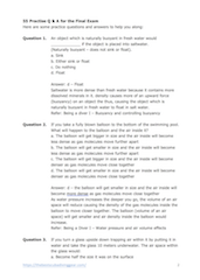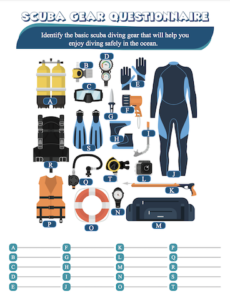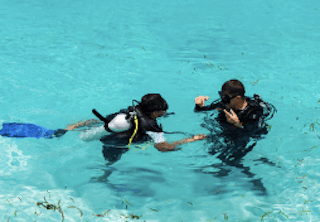Last Updated on May 11, 2022 by Dan
In this humorous blog post, we’ll explore 12 ways to fail your PADI Open Water exam so that you know what not to do on the big day. From forgetting wetsuit defogger and mask strap pins, to not knowing how to use a dive compass or which hand signal is used for emergency ascent, here are some easy ways to ensure that you don’t pass!
If you are looking for 55 PADI Open Water Diver Final Exam Practise Questions, here they are:
55 Practise Open Water Diver Final Exam Questions
- Download a formatted copy of 55 Open Water Diver Practise Questions & Answers as a PDF.

Book a 30 minute Coaching Call on Zoom
Do you need Coaching before your Exam?
If you would like help preparing for your Open Water Exam and need to ask a few questions from a PADI Divemaster then book a call with Schuan.
Schuan is a PADI Freediver, Divemaster and Scuba Instructor who would like to help you prepare for your exam.
He is a professional Commercial Diver with Australian Diver Accreditation Scheme (ADAS) Part 1-3 certified licenses, IMCA Dive Medic Technician (DMT) and Assistant Life Support Technician (ALST). He is currently working on material with us to help others in their professional careers.
Link to Book in: https://payhip.com/b/QqPXw
Check our Open Water Diver Activity Sheets for Scuba Gear, Common Words & Diving Hand Symbols.
OWD Scuba Diving Activity Sheets
Open Water Diver Activity Sheets for Scuba Gear, Common Words & Diving Hand Symbols.

- 7 pages
Easy Ways To Fail Your PADI Open Water Exam
-Don’t be on time for your exam. If you are more than 30 minutes late, you’ll fail automatically.
-If you enter the wrong location for your PADI Open Water exam, then don’t tell anyone about it. You will automatically fail and have wasted a lot of people’s time and money!
-If you don’t know how to use a dive compass, then keep it hidden. You’ll be needing that for your next PADI Open Water exam!
-If your mask strap is broken, then don’t tell anyone. You will fail for not having a correctly functioning diving regulator!
-Don’t practice what you should know before the day of your exam: rules to follow in order to pass a PADI Open Water Exam and knowledge of safety procedures when scuba diving (such as emergency ascent) can be found on the internet or at any dive shop near you.
-Remember that during an emergency ascent, use one hand signal per second. If necessary, this means using both hands simultaneously until ascending vertically out of the water.
-Make sure your weights are on correctly before getting into the pool, as you will be disqualified if they fall off during a skills test!
-If you have to remove any items from your person, such as earplugs or masks, make sure that when you put them back on again they’re in their correct orientation–with one hole above and one below for both ears and with no obstruction (like long hair) anywhere near your mouth.
-Do not stray too far out of arm’s reach of an instructor at all times: this is crucial to remain within safe diving distance so that help can arrive quickly in case anything goes wrong underwater. You should not try to beat your instructor to the surface, this is a sure way to fail.
-Learn how to use buoyancy compensators properly so that you can control your depth when diving.
-Do not over-exert yourself on scuba dives, instead take it easy and make sure to stay within the limits of your air supply-especially if you know that there will be limited space for breathing at a particular dive spot. This is especially important in more extreme environments like deep water (greater than 30 meters) or murky waters which are harder to see objects in!
-Make sure all equipment is secure before entering the water so that no items get lost during a skills test.
We have recently produced an online exam prep course on the Teachable platform: https://openwatercourses.teachable.com/ which includes our downloadable guide with practice test questions, diving hand signals handout and an online quiz for $35.
Silly ways to Fail:
- Don’t do anything in the water and show the instructor that you can’t maneuver yourself around.
- Copy answers from other people or give the wrong answers consistently
- Don’t listen to anything the instructor says and get distracted or drunk
- Don’t pay your bills for the Dive Centre – you won’t get signed off
- Lie about medical problems
- Wearing old gear that is in need of repair or considered unsafe
- Be rude or disrespectful to your instructor
Additional tips:
-Practice these skills with friends who have already passed their open water exams and are willing to help–you’ll need it if you want to avoid failing yourself!
-Know how to share with other divers underwater: this means knowing where everyone else’s mask/equipment goes so that they don’t bump into each other while trying desperately to find their own gear after a dive.
-Do not feed the fish! Feeding is a big no-no because it can lead to an overpopulation of certain species and cause harm or even death for both people and animals in the area.
-Make sure you have all your equipment with you, especially tanks before making any jumps into deep water (greater than 30 meters). You don’t want to go diving without being able to breathe at some point during your trip!
-Make sure that there are no bubbles coming out from around your mask when submerged…bubbles will interfere with visibility underwater if they come up close enough on either side of where someone has their eyes positioned under the water’s surface. Bubbles also indicate bad equalization which can lead to serious ear and sinus problems.
-Be mindful of your buoyancy while swimming in open water! The goal is for you to be neutrally buoyant so that neither your head nor feet are sticking out the surface of the water. If either one sticks out, then you’ll need more weight on your belt or vest which will cause drag when moving through the water.
-Do not bring any personal items with you into deep water (greater than 30 meters). This includes credit cards, wallets, etc., because if they’re lost at depth it could take hours or even days before someone finds them. Keeping valuables on dry land ensures a quicker recovery process should something happen during an excursion underwater.
-Avoid touching coral reefs because the natural oils on your skin can cause irreparable damage to them. The best thing you can do for this environment is to leave it untouched by humans as much as possible. Coral reefs provide shelter and food to marine life.
-Remember that many of the rules need to be observed in open water as well! These include staying safe during night dives, never using alcohol while swimming/diving etc. Read each rule carefully so there are no surprises when it comes time for testing.
We hope this article helped you understand what NOT to do to fail your PADI Open Water exam!


